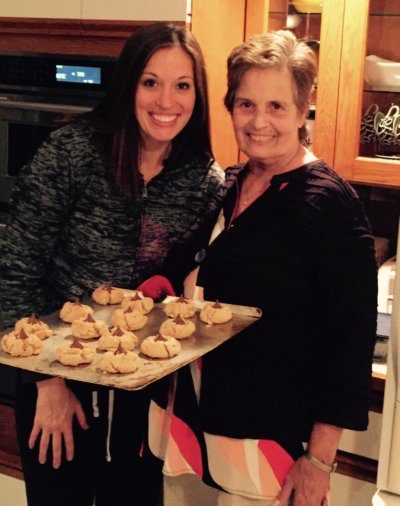
“Gosh, It’s scary. It’s so scary. I’ve thought about going in and getting tested to see if I have the gene and what that might mean, but there’s nothing I can actually do to prevent it from coming on.”

Breanna Olson is the daughter of an Alzheimer’s disease patient. She was only 25 years old when her mother was diagnosed in 2007.
“Knowledge is power—and that’s good—but for me, I’ve chosen so far not to (take the test),” Olson said to Rewire. “What I’ve tried to do is really learn. I know I’m at a higher risk so, let’s just pretend I have it. What kinds of decisions should I be making right now?”
Children of people with Alzheimer’s are at a higher risk of also developing the disease. But really, “anyone with a brain is at risk,” Olson said, which is why getting educated about the disease is important for everyone—young, old and in between.
According to a new PBS documentary, “Alzheimer’s: Every Minute Counts,” the disease is the most serious health epidemic in the United States. It’s also the most expensive health issue in our country. The number of individuals with the disease is skyrocketing. Caregiving takes a toll like no other. Alzheimer’s receives less federal funding for research than other major diseases.
There is no vaccine.
There are no drugs to stop the progress of the disease.
There is no cure.
And with every passing minute, the disease is affecting more and more people. Eventually, every single one of us will be affected by it. Unless we find a cure.
A progressive disease that destroys memory, thinking and behavior, Alzheimer’s gradually takes away just about everything from those battling it. Currently, 5 million Americans live with the disease. That number is climbing at an alarming rate. In “Alzheimer’s: Every Minute Counts,” produced by Twin Cities PBS, you’ll hear from experts on the disease and from families affected by it.
All illnesses take a toll on those affected by them, but “Every Minute Counts” explains that Alzheimer’s is different in that people with the disease need a lot of attention and often times, as it progresses, around-the-clock care. These caregivers are often family members. Olson knows this first-hand. After her father—who was her mother’s primary caregiver—unexpectedly passed away in 2015, Olson, now in her early 30s, shares that responsibility with her sister.
“This is really a family disease,” Olson said. “The burden of it goes beyond the person diagnosed.”
It’s incredibly difficult to “watch your mom vanish in front of you over time,” she said.
Being a caregiver to a parent, especially at the beginning of your adult life, means “there’s so much to balance in terms of time—time management,” Olson said. “There are just never enough hours in a day and the feeling of always feeling tired and never feeling that you’re on top of everything or giving anyone the attention that they deserve… When you are faced with having to make sure your parent is safe and make sure that your parent is cared for—when it’s a reversal role—there adds some sort of extra pressure that’s hard to explain.”
Olson tries to think about it as a way of giving back.
“My parents gave me life,” she said. “They raised me and they gave me so much of their energy and time. I feel so grateful for the parents that I had and there are not many people who get to provide that same type of care back to their parents… You want to live up to the woman that they created, that they helped define, the values that they placed in you and now you get the awesome responsibility of caring for them like they cared for you. And yet, wow, the pressure.”
Now in her mid-30s, Olson identifies as a borderline millennial-Gen Xer. She’s a working professional, about to get married and become a parent.

“I have a growing career that I care a lot about and I want to do really well at that,” Olson said. “I went to grad school. I’ve invested in my career and education and I want to see myself go far and those are also values they (my parents) instilled in me. Getting married, having a stepson, ways that I want to be there in my relationship… But, you end up having to de-prioritize friendships. De-prioritize travel. De-prioritize getting involved in your community. Sometimes not take that promotion. Sometimes move and relocate before you necessarily wanted to, in order to provide that care because that’s more important than those other things.”
Even though Olson said she feel like she’s “de-prioritizing getting involved,” she is giving back in a big way. After her mother was diagnosed, she connected with the Alzheimer’s Association and has become an advocate for the disease. She learned about the importance of speaking out about Alzheimer’s, especially at a young age.
“We have to change the voice of Alzheimer’s so that people don’t just view it as an old person’s disease,” she said. “I found that my voice is very powerful… When I was 25, 27, 28, I would take people by surprise and they would listen and that’s really powerful.”
If a parent or loved one is showing signs of dementia, Olson advises getting a formal diagnosis as soon as possible. If the diagnosis is positive, connect with the Alzheimer’s Association for support.
“It’s scary, but if the disease is happening—there’s no point in not getting a formal diagnosis,” she said. “Once you get that, then you and your family can start mapping out what the future should be looking like. And you can still include (the) parent in some of the key decisions while they are still able.”
“Alzheimer’s: Every Minute Counts” premiered Wednesday, Jan. 25. Watch online or check broadcast dates and times here.
![]() This article originally appeared on Rewire
This article originally appeared on Rewire
© Twin Cities Public Television - 2017. All rights reserved.
Read Next



